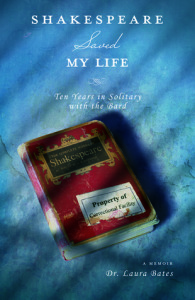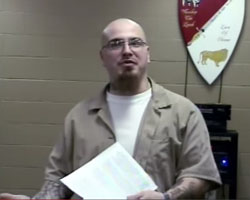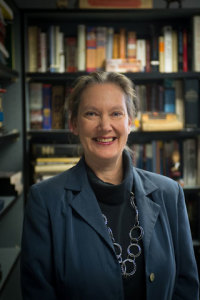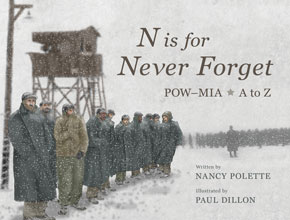KING RICHARD II: Act V Scene V
The dungeon of Pomfret castle
Enter King Richard, alone.
King Richard:
“I have been studying how I may compare
This prison where I live unto the world:
And for because the world is populous
And here is not a creature but myself,
I cannot do it; yet I’ll hammer it out.”
This make-a-difference story runs much like a Shakespearean play within a play.
It’s the story of Laura Bates, an inner-city kid from Chicago’s west side and now professor at Indiana State. While volunteering to teach Shakespeare to maximum-security prisoners, she forms an unlikely friendship with Larry Newton, a lifer in solitary confinement, and overcomes her fear of boats.
It’s also the story of Larry, a violent criminal who signed away his right to parole at age seventeen. By reflecting on his acts—and those in the Shakespearean plays he reads—he breaks free of his own internal prison. Although his fifth grade education had not included exposure to Shakespeare, his natural gift to interpret the plays leads him to write an entire series of workbooks to help students in and out of prison apply the plays’ lessons to their lives.
This is a story about a book, The Complete Works of Shakespeare, containing 400-year-old plays, that saves more than one life.
 And now, it’s also about how the story of these stories, Shakespeare Saved My Life: Ten Years in Solitary With the Bard, continues to make a difference in prisons and schools around the world as others become inspired by the plays, the stories, and the book about how the plays and stories made a difference for each of these characters.
And now, it’s also about how the story of these stories, Shakespeare Saved My Life: Ten Years in Solitary With the Bard, continues to make a difference in prisons and schools around the world as others become inspired by the plays, the stories, and the book about how the plays and stories made a difference for each of these characters.
~
The concept of reading and acting out Shakespeare in prisons is not new, but doing so in solitary confinement, with those considered to be the most dangerous and hardened inmates, was unheard of—until Laura Bates decided to give it a try.
At first, she was skeptical and thought maximum security prisoners were beyond rehabilitation, so she began teaching college classes at Chicago Cook County Jail with first-time offenders. As she worked on her doctorate under Shakespeare scholar David Bevington at the University of Chicago, Laura taught English courses at medium-security Putnamville Correctional Facility. When she became an adjunct professor at Indiana State, she volunteered at Wabash Valley Correctional Facility—one of two prisons in Indiana with a “Supermax,” a long-term disciplinary housing unit, a prison within a prison, where the worst offenders are housed in windowless, concrete isolation cells for years at a time.
That’s where Laura met Larry.
In and out of juvenile facilities since he was ten, Larry was convicted of murder at age seventeen and given a life sentence with no chance of parole. When Laura arrived at Wabash, Larry had been in solitary confinement for a decade, with repeat violent offenses and several escape attempts.
Larry was not a prisoner Laura thought she could work with, until she read his written response to a Shakespeare assignment she distributed to segregated prisoners as a way of screening prospective participants. She asked the inmates to read a soliloquy from the last act of Richard II and to write about what they understood from the excerpt.
Most prisoners offered brief responses, but Larry submitted a full page, double-sided, thoughtful exposition that showed his awareness of multiple interpretations.
His participation in the program proved he was able to connect to Shakespeare’s messages on a very personal level. Their first play was Macbeth. Macbeth is a common text used in prisons because it exposes the inner conflict of a killer who at the beginning of the story is not a bad person. Larry said he found himself questioning Macbeth’s motives: “Why does he do this deed that he knows is wrong? Why does he give in to peer pressure?”
All the prisoners got caught up in the action-packed drama. Ultimately, they found themselves relating to the main character’s inner struggle. As they analyzed Macbeth’s motives and why he gives in to something he knows he doesn’t want to do, the men questioned their own motives.

Prisoner-for-life Larry Newton was allowed to leave solitary confinement and rejoin the general prison population after his transformation in Laura’s Shakespeare program. “Shakespeare Saved My Life” he says.
Larry noted that the more insight he had into Shakespeare’s characters, the more insight he had into his own character.
When it appeared likely that Larry would be transferred out of segregation to another facility, Laura gave him a short survey of the program. In response to the question, “What has Shakespeare done for you?” Larry wrote, “Shakespeare saved my life.”
It turned out Larry was not transferred right away and was allowed to continue in the program. Out of solitary confinement, he and Laura were able to talk for the first time without a steel door between them.
Larry explained what he meant by his response (excerpted from Shakespeare Saved My Life): “I meant it both ways: literally and figuratively. Literally…for so many years I had been really self-destructive, on the razor’s edge every day. I’m confident that I would’ve done something drastic and ended up on Death Row. Or I would’ve one day found the courage to take my own life. So literally, he saved my life.”
“And I meant it figuratively,” he continued. “Shakespeare offered me the opportunity to develop new ways of thinking through these plays. I was trying to figure out what motivated Macbeth, why his wife was able to make him do a deed that he said he didn’t want to do just by attacking his ego: ‘What, are you soft? Ain’t you man enough to do it?’ As a consequence of that, I had to ask myself what was motivating me in my deeds, and I came face to face with the realization that I was fake, that I was motivated by this need to impress those around me, that none of my choices were truly my own.
“And as bad as that sounds, it was the most liberating thing I’d ever experienced because that meant that I had control of my life. I could be anybody I wanted to be. I didn’t have to be some fake guy that my buddies wanted me to be. When I started reading Shakespeare, I was still in segregation; that circumstance didn’t change. But I wasn’t miserable anymore. Why? The only thing that was different was the way that I saw myself. So the way that I felt about myself had to be the source of all my misery. I’m of the opinion that we are the source of our misery; we perpetuate our own misery. And that realization is empowering! So Shakespeare saved my life, both literally and figuratively. He freed me, genuinely freed me.”
Laura says, “I’m pleased to see that this has had a lasting impact: on me, on Larry, and, I believe, on many other prisoners who were involved, whether it was for years or even just a few days.”
Throughout his ten years in the program, Larry became a serious student and a leader within the program, helping other inmates understand, interpret, and reflect on the plays. It changed his perspective and behavior. He had no violent incidents since his first day in the Shakespeare program.
In fact, Laura studied the conduct records of twenty of the most long-standing and active participants in the program and found that their combined conduct history accounted for more than 600 violent or Class A offenses, including weapons charges and assaults, in the years before the Shakespeare program. During their time in the program, there were only two charges: for cell phone possession. Of the hundreds of prisoners who have been in the program—some for months, some for years—not one violent offense was committed.
She reiterates, “The prisoners’ conduct records shows that even the hardcore prisoners in solitary confinement who had a large number of violent offenses in prison had—during their time in the Shakespeare program—no violent offenses at all. Of the hundreds of prisoners I worked with, there was not a single violent offense. I hope that continues to be a lasting impact.”
Laura’s book Shakespeare Saved My Life shares the success of her program in solitary confinement as well as Larry’s transformation. Reading the book has prompted other prisons to set up similar programs. Laura remains involved in the programs, volunteering her time and providing books, videos, and other materials. With no funding for such a program, everything is voluntary.
“I think it’s important that the inmates choose to participate on a voluntary basis also,” she says. “I’m there because I want to be, and they are there because they want to be.”
After Larry’s transfer out of Wabash, Laura helped create several similar programs throughout Indiana. “Working with other professors from across the state, we created Shakespeare programs at Westville Correctional Facility, Pendleton Correctional Facility, and Rockville Correctional Facility,” she says. “More recently, I was contacted by the Federal Bureau of Prisons and invited to create a series of Shakespeare programs in several units of the United States Penitentiary in Terre Haute.”

Laura Bates, a professor at Indiana State, continues to volunteer in prison programs and uses materials developed with maximum security prisoners in her own classroom and with at-risk youth.
Laura says some of the prisoners’ insights about the plays were beyond those of world-renowned Shakespeare scholars. As one way to share those insights to benefit others, Laura and Larry created several workbooks together: Macbeth, Hamlet, Othello, Romeo and Juliet, Taming of the Shrew, The History Plays, and A Guide to the Complete Works. They are being used in each of the Shakespeare programs in prisons, as well as in Laura’s on-campus Shakespeare classes.
“Students on campus are especially grateful for Larry’s down-to-earth, non-academic approach,” she says. In each of the workbooks, Larry includes a “consideration,” a point to consider in the play that examines the motives of the character and brings it back to the reader’s own motives and choices.
Larry himself is still in prison, and will be for the rest of his life. “He continues to be a positive influence on those around him, inspiring other inmates to take on the Shakespeare challenge and mentoring new readers,” says Laura.
Other participants have returned to their lives outside prison. She says, “Several of the prisoners I worked with have been released, including some of those I worked with in solitary confinement. Transitioning from months, or years, of isolation has to be an especially difficult challenge, but none of the prisoners who were in the Shakespeare program have returned to prison after their release. That is a success story in itself, as the average rate of recidivism among the general prison population is quite high: most prisoners return within two years.”
She has also worked with at-risk juveniles in prison and in alternative high schools in Indiana and in Chicago. “I do believe that sharing the materials created by Larry and other prisoners who had come to prison as teenagers—serving life sentences for murders committed between the ages of fourteen and eighteen—has reached the juveniles and, hopefully, inspired some of them to change their criminal behaviors.”
So Shakespeare is not only saving prisoners, but also future victims, and acts as an interesting and effective deterrent for would-be prisoners.
“Humbly and modestly, I have to confess: I hoped this would change the world!” says Laura. “As Larry often told me, any little change does change the world. In some small way, I hope that this book has had an impact on the way we look at Shakespeare and the way that we look at prisoners.”
In the two years since the book was published, Laura has continued to receive emails, calls, and letters almost every day from readers who were touched by the book. Recently a young woman in Korea who read the book in translation told her:
“The story of Larry Newton and your attempt to change his life had a big impact on me. The fact how not only Newton but also other prisoners have changed their life by your lesson and Shakespeare amazed me greatly. Honestly, I couldn’t believe it at first. I couldn’t believe that the life of a prisoner, who had never received formal school education and spent his whole life in prison, could be changed by a lesson. I think your Shakespeare program signifies the infinite potential of education. It tells me that when a person encounters a decisive chance, even his spirit can be endlessly changed. Also, this is the book that proves the fact that books can change a man’s behavior, character, and personality. I am sure that your book would have a big impact on many readers all over the world… I am profoundly grateful to you for writing this book.”
Laura adds, “I hope that this book inspires more people to create programs like this one. It truly can save lives.”
Laura Bates: www.LauraRaidonisBates.com
Listen to Laura talk about her experience in this video.
Photos courtesy Laura Bates.
Feature photo: Laura’s classroom in Supermax was a chair in a narrow hallway. Each prisoner stayed in his own cell and communicated through a slot in the door.
Karen Pavlicin-Fragnito is an award-winning writer and publisher of Books Make a Difference. While The Complete Works of Shakespeare is one of her favorite books, her collection also includes early 1900s printings of Shakespeare’s individual plays. She believes an underlying message in much of Shakespeare’s work is one of hope and Laura’s program confirms that. Connect with Karen on the Web, Facebook, and Twitter.
This article was first published in March 2015.












I saw Laura profiled (oddly enough) on the show Lockup a few years ago. It was an incredibly interesting segment and really highlighted how the written word can transcend time and place.